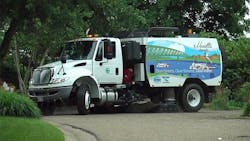Situated along the Muskingum and Ohio Rivers, the small city of Marietta, Ohio, population 20,000, puts a focus on reducing the sediment and debris that enter its waterways. According to Stormwater Manager Kathy Davis, a crucial part of those efforts is the city’s street sweeping program. Since 2003 the City has been required to administer a stormwater management plan with the Ohio EPA. The plan helps reduce sediment, phosphorous and other pollutants from entering the rivers.
Sweeping takes place on 85 miles of streets. With hundreds of catch basins connected to the surface transportation network, the city must also clean them on a regular basis as well. In order to maximize the use of taxpayer dollars the City made sure to purchase a multi-purpose street sweeper with a catch basin cleaning capability. Between street sweeping and catch basin cleaning the City is able to remove 200 tons a year with a single machine.
Strategy
The Marietta Streets Department has divided the city into five sections for street sweeping and catch basin cleaning, says Streets Superintendent Todd Stockel. During the springtime months, when the temperature may not be warm enough to complete any one section at time, “we’ll stay in one location until we sweep…every street on that location before we move onto the next one,” he explained.
In May, with summer weather in sight, Marietta launches its five-day street sweeping schedule, which covers one section per day Monday through Thursday, and ends with overnight sweeping of the business district Thursday night and into Friday morning. The schedule stays consistent throughout the summer, Stockel said, allowing residents to plan ahead and move their cars to the other side of the street on their neighborhood’s designated day.
Catch Basin Cleaning
The city uses an A7 Tornado regenerative air street sweeper from Schwarze Industries, which also has a catch basin hose attachment. According to Stockel, the biggest challenge the city faces when it comes to its catch basins is leaves. “We have a massive amount of trees that lose leaves,” he said. Although Marietta offers leaf pickup over a six-week period in the late fall, and works to educate the public on placing the leaves between the curb and sidewalk so they stay out of the streets, some of the leaves—along with some salt and sand from the city’s snow removal efforts—make it into the storm drains.
The city of Marietta has a sewer vac truck, but the Streets Department has found the street sweeper to be its preferred equipment for catch basin cleaning. One of the primary reasons is size. The sewer vac truck is “problematic to get into the tight corners throughout the city of Marietta,” Stockel said. “All our streets are accessible to the street sweeper.”
Stockel describes the street sweeper as a “workhorse” due its abilities to perform both street sweeping and catch basin cleaning. He noted that the A7 Tornado’s spray wand attachment help “drastically” with the cleaning efforts. “If it’s dried up, you can wet the product down, wet the sand down, and make it more … pliable to come out of the storm drain altogether,” he said.
A Vital Resource
The use of the street sweeper for both sweeping and catch basin cleaning goes a long way toward keeping sediment and debris out of local waterways, and therefore helping the city to meet U.S. Environmental Protection Agency guidelines. It is a piece of equipment Stockel doesn’t feel the city could do without. “It’s relied upon very heavily in our schedule and maintenance program in addition to what it does throughout the summer months on its scheduled street sweeping, so it’s vital,” he said.
Public Outreach and serving the entire community
Unlike structural BMPs, street sweepers are able to serve the entire community. Because sweepers are seen on their routes throughout the community, stormwater managers utilize them to meet another EPA mandated minimum control measure, public outreach. The City of Marietta promotes their “Clean Streets, Clean Streams, Clean Water” campaign while in Asotin County, they promote their popular “Only Rain Down the Drain” campaign.
Editor's Note: Scranton Gillette Communications and the SGC Water Group are not liable for the accuracy, efficacy and validity of the claims made in this piece. The views expressed in this content do not reflect the position of the editorial teams of Water & Wastes Digest, Water Quality Products and Storm Water Solutions.
